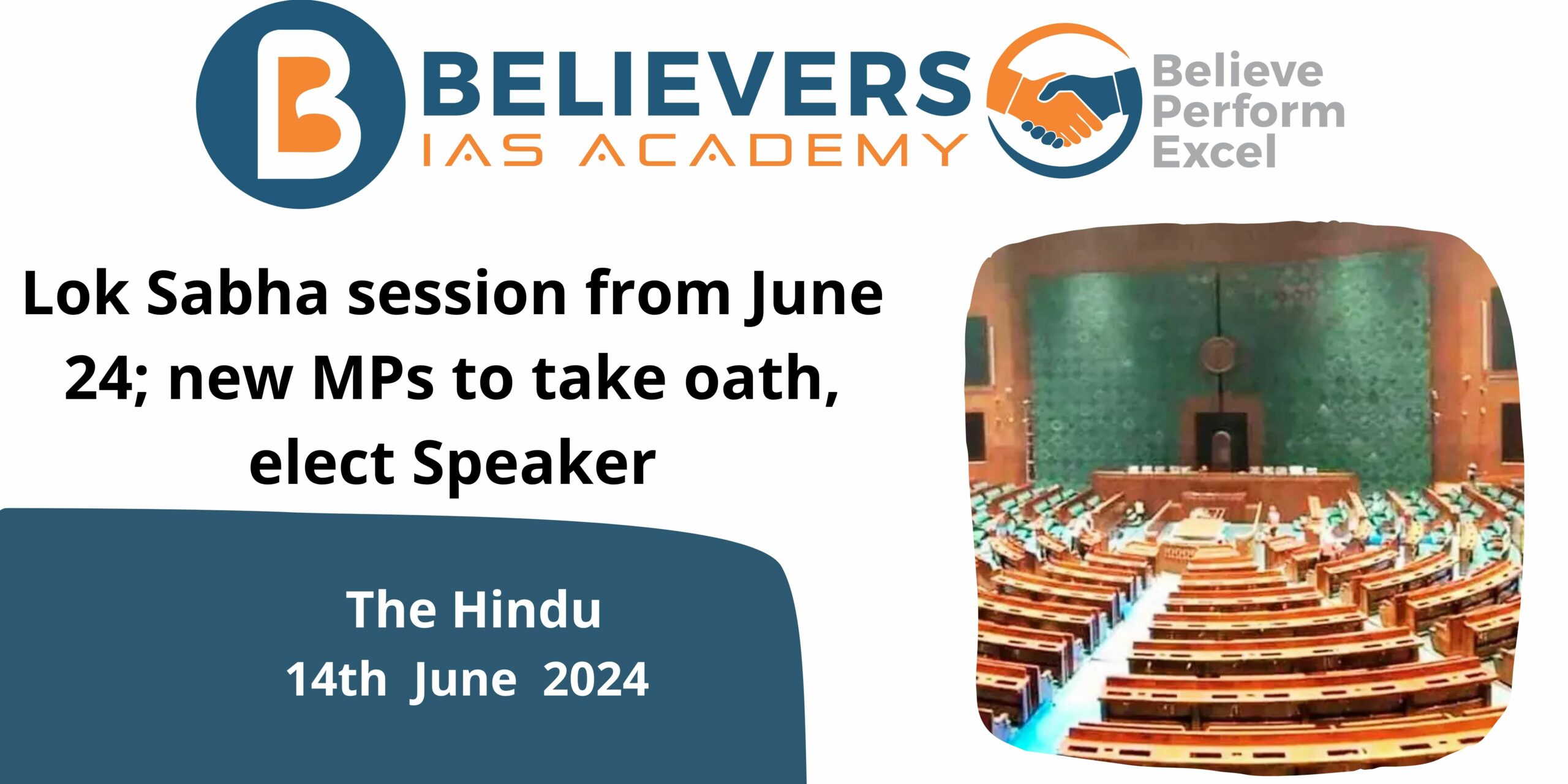Lok Sabha session from June 24; new MPs to take oath, elect Speaker
Context:
The first session of the 18th Lok Sabha will be held from June 24 to July 3, Parliamentary Affairs Minister Kiren Rijiju announced on Wednesday. The Rajya Sabha session will start on June 27,2024.
Relevance:
GS02 (Polity)
Constitutional Provisions for Ministerial Oaths
- Article 164(3): Before assuming office, a Minister must take the oaths of office and secrecy, administered by the Governor, as prescribed in the Third Schedule.
- Article 164 mandates that the oath’s text is inviolable and must be recited exactly as it appears in the prescribed format.
- Third Schedule: The oath taker must either “swear in the name of God” or “solemnly affirm” to “bear true faith and allegiance to the Constitution.”
- If the oath taker deviates from the prescribed text, the Governor must correct them to ensure accuracy, and once the Governor acknowledges the oath and the Secretary to the Governor certifies its administration, it becomes legally binding and cannot be contested.
Parliamentary Sessions in India
Summoning of Parliament
- Article 85 of the Indian Constitution outlines the summoning of Parliament. The power to convene a session lies with the Government, specifically the Cabinet Committee on Parliamentary Affairs.
- The President formalizes the decision and issues summons to the Members of Parliament (MPs) to meet for a session.
- India does not follow a fixed parliamentary calendar. Traditionally, Parliament meets three times a year:
- Budget Session: The longest session, starting in late January and ending by April or early May.
- Monsoon Session: A three-week session usually held from July to August.
- Winter Session: Held from November to December.
Summoning Process
- Summoning involves calling all MPs to convene.
- The President of India summons each House of Parliament at intervals, ensuring that the gap between two sessions does not exceed six months.
- This guarantees that Parliament meets at least twice a year.
Adjournment
- Adjournment suspends the meeting of the House, which reconvenes at a specified time.
- The suspension can be for hours, days, or weeks.
- Adjournment sine die: If the House is adjourned without setting a date for the next meeting.
- The presiding officer (Speaker or Chairman) of the House holds the power to adjourn or adjourn sine die.
Prorogation
- Prorogation marks the end of a session of Parliament, distinct from dissolution (applicable only to the Lok Sabha, as the Rajya Sabha is a permanent body).
- The President of India prorogues the session.
Quorum
- Quorum is the minimum number of members required to be present for conducting a House meeting.
- The Constitution stipulates that one-tenth of the total membership constitutes a quorum.
- Lok Sabha, at least 55 members must be present.
- Rajya Sabha, at least 25 members are needed.
Joint Session of Parliament:
Article 108:
- To resolve a deadlock between the Lok Sabha and the Rajya Sabha, the Constitution provides for a joint sitting.
- The President calls for the joint session, which is presided over by the Speaker of the Lok Sabha. In the Speaker’s absence, the Deputy Speaker of the Lok Sabha presides. If both are absent, the Deputy Chairman of the Rajya Sabha presides. In the absence of all these officials, any member of Parliament can preside by consensus of both Houses.
- These procedures ensure the smooth functioning and continuity of legislative processes within the Indian Parliament, reflecting the robustness of India’s democratic framework.



